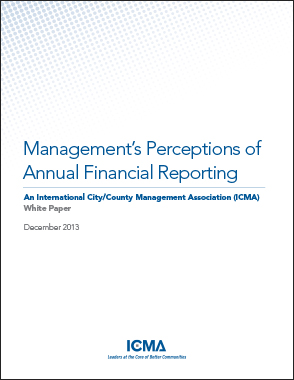
Local governments spend considerable time and money to produce required financial statements. Is the money well spent? And how are these financial statements used?
To answer these questions, Northern Illinois University and its Center for Governmental Studies gathered feedback from city and county managers and administrators, as well as finance directors and officials.
Overwhelmingly, management perceives a net benefit to the annual financial reports. However, 64 percent of respondents indicated that these audited statements do not play a significant role in their policy decisions. And while 80 percent of respondents have implemented Governmental Accounting Standards Board (GASB) Statements No. 34, 44, 45, and 54; less than a third of them found the statements to be beneficial.
The key recommendations of the ICMA white paper include:
- Reassess content, semantics, and structure of the annual financial report to clarify the facts needed and reported, and enhance transparency.
- Leverage new technologies to simplify and speed up the generation of annual financial reports, integrate data, improve productivity, and increase report timeliness.
- Increase outreach/support efforts between local government management, their associations, and the GASB. Direct conversations between government managers and GASB could help gain consensus and a better understanding of the benefits of new reporting standards.
To learn more about the research and further recommendations, read the newly published white paper: Management’s Perceptions of Annual Financial Reporting.
New, Reduced Membership Dues
A new, reduced dues rate is available for CAOs/ACAOs, along with additional discounts for those in smaller communities, has been implemented. Learn more and be sure to join or renew today!
